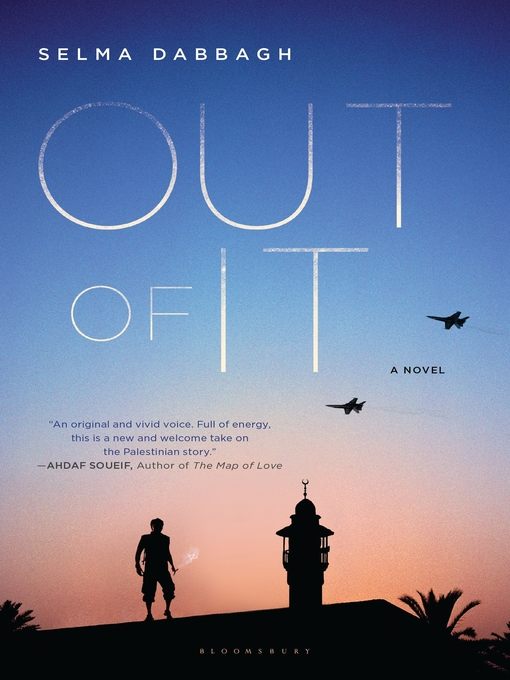
Out of It
A Novel
- اطلاعات
- نقد و بررسی
- دیدگاه کاربران
نقد و بررسی

May 7, 2012
In this important and captivating debut novel, the ravages of occupied Gaza alternately unite and undo a proud and fiercely intellectual Palestinian family, the Mujaheds. As their history unfolds and their future is etched out against a violent and unknowable landscape, the struggle for a voice becomes equally more urgent and more elusive. Regrettably, the book begins in awkward spurts, with names, places, and memories revolving too fast for readers to make sense of who’s who. But once the family is established—Iman, the sister, who doesn’t cover her hair; Sabri, the younger brother, whose legs were lost to a car bomb; and Rashid, the other brother, who’s going to London on scholarship—the book picks up momentum and the prose builds with increasing clarity. Incidental moments are often the most disarming and exquisite. Early on, Iman acquires a bouquet of flowers that she absentmindedly passes off to a shopkeeper, who pulls back at the sight: “Oh, no, miss. I can’t. They take too much water.” While horrendous acts of violence, both at the hands of the Israelis and as a result of Palestinian infighting, threaten and destroy, it is in the indignity of not being able to water flowers that despair becomes tangible and that the tragic loss of life and culture resonates most profoundly. Agent: Karolina Sutton, Curtis Brown.

August 1, 2012
British-Palestinian writer Dabbagh's debut examines her people's tragic past and conflicted present through the prism of one family's experiences. The Mujaheds are the sort of intellectual, nonreligious Palestinians who once formed the expatriate backbone of the struggle to reclaim their homeland, but who are rapidly being marginalized in Gaza. Indeed, Jibril, the father, has abandoned the Palestinian Liberation Organisation--and his wife and kids--for the consumerist narcolepsy of a Gulf state. Rashid, like his father, just wants to get out of Gaza and is thrilled in the opening pages to get a scholarship that will enable him to return to London and his English girlfriend Lisa. His twin sister Iman is frustrated by the Women's Committee she's joined, whose members disdain her as an outsider who's only recently returned to Gaza. The only people who seem to share her thirst for meaningful action are the Islamic fundamentalists who gain credibility each time the Israeli army bombs civilian sites or bulldozes Palestinian homes. Their mother, once the most militant of all, is reduced to clipping newspaper articles and answering questions for a history of the movement being written by eldest son Sabri, who lost both his legs, his wife and his infant son in a car bombing facilitated by a Palestinian informer. Dabbagh unsparingly shows a people divided and demoralized by six decades of exile and powerlessness, and her novel quietly but acidly indicts Western ignorance of and indifference to the Palestinians' plight. Yet, the book is also a finely wrought tale of family and coming-of-age that fulfills the mandates of any serious work of fiction: Dabbagh creates characters we care about, puts their equally valid but conflicting agendas into play and engineers an ending that brings individual satisfactions and some closure without ever suggesting that the larger dilemmas have been resolved. Fine work from a gifted writer who has important subject matter to explore.
COPYRIGHT(2012) Kirkus Reviews, ALL RIGHTS RESERVED.

April 1, 2012
As they endure fear and violence (including nightly bombardments) in their small town in contemporary Gaza, twin sister and brother Iman and Rashid react differently: Rashid seeks solace in smoking marijuana, while his sister contemplates joining a resistance organization. Their wheelchair-bound older brother, who's writing a history of Palestine, helps maintain the family's equilibrium. Rashid is overjoyed when he wins a scholarship to study in London, thinking that this is his long-anticipated escape. Once there, however, he's picked up by the police in a case of mistaken identity and has enough hash in his coat pockets to be deported. Iman had visited Rashid but returned home almost immediately, put off by the superficiality of big-city life and a lack of sympathy for the Palestinian cause (she hears comments like "we deserve the fate we have got"). The novel's climax sets the siblings on a path from which there is no return. VERDICT With this debut, Pushcart Prize nominee Dabbagh reveals a gift for using language to portray deep emotions and to illustrate a story with brilliant imagery. Though at times the action and the switch from one setting to another can be confusing, this is a valiant effort. [See Prepub Alert, 2/2/12.]--Lisa Rohrbaugh, Leetonia Community P.L., OH
Copyright 2012 Library Journal, LLC Used with permission.




دیدگاه کاربران